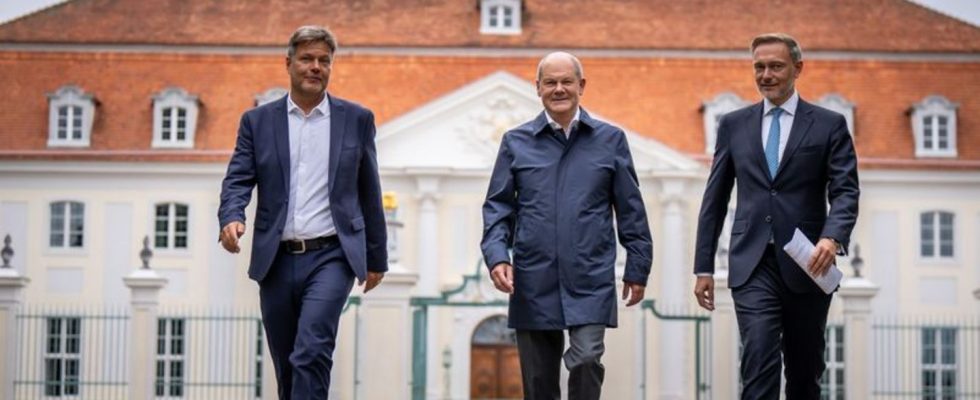10 point plan
Economic downturn: Ampel plans “offensive” for the economy
The federal government is currently meeting at a cabinet meeting in Meseberg near Berlin. photo
© Michael Kappeler/dpa
It is not the first time that the traffic light in Meseberg is trying to heal its wounds. The key question is: Can the coalition get the difficult economic situation under control?
The federal government wants to give the German economy more support in the current slump. For this put Chancellor Olaf Scholz (SPD), Economics Minister Robert Habeck (Greens) and Finance Minister Christian Lindner (FDP) presented a 10-point plan.
Among other things, tax relief for companies of seven billion euros a year until 2028 and an acceleration of approval procedures are planned. However, the industrial electricity price demanded by the SPD parliamentary group and the Greens to cushion the high energy costs does not appear in the paper.
In essence, it is about “that investments are made now and not postponed,” said Scholz. Habeck described the economic and political situation as challenging. “In any case, it is not such that one can say: the economy makes the economy and politics stays out of it,” he emphasized. The fear: That companies invest too little in their future and in climate protection and that housing construction will continue to decline.
Lindner law gets an update
On Wednesday, the so-called Growth Opportunities Act is to be passed by Finance Minister Lindner with a two-week delay. At that time, it failed due to the veto of Family Minister Lisa Paus (Greens), who demanded more money for their basic child security. In the meantime, the signs are different: the traffic light has agreed on the basics of basic child security.
The ministries used the delay to update the law. New: a 500 million euro economic stimulus aimed at residential construction through extended depreciation options. This promotes faster refinancing and is intended to provide investment incentives that stabilize the construction industry. The tax credits for losses will also be slightly expanded.
Linder’s law forms the core of the traffic light’s 10-point plan, which otherwise contains many projects that the federal government has long championed. This includes the expansion of electricity production from sun and wind, more digitization and the recruitment of skilled workers.
Main subject of the exam: The ailing economy
The content of the closed conference is dominated by the precarious economic situation and recipes for improvement. Many economists are now expecting a decline in German economic output for the year as a whole. There is talk of a danger of de-industrialization. The British “Economist” recently asked whether Germany was again the “sick man of Europe”.
The German economy now expects a clear signal from Meseberg. “The strategic competitiveness of our country must now be the focus of all political action,” demanded employers’ president Rainer Dulger.
Open issue: Electricity costs for industry
Whether the industry can rely on a state-subsidised electricity price initially remained completely open on Tuesday. According to information from the German Press Agency, the ministers had not even touched on this topic until the afternoon.
The rifts are big: Economics Minister Robert Habeck (Greens) campaigned again for his idea on Tuesday. In the ARD “Morgenmagazin” he warned of the consequences if this relief does not come: “I’m not saying that the chemical industry, the basic industry will then disappear from Germany tomorrow. But they will then not continue to invest in the location and then leave Germany in the future .”
The FDP rejects the subsidy, Scholz is also skeptical. The Greens, on the other hand, are in favor, and Scholz’s SPD parliamentary group also approved a concept for an industrial electricity price on Monday. A compromise is not in sight.
Chancellor wish: More peace please!
Scholz will hope that this next expected confrontation will be quieter than the last. Before the retreat began, he again called on his ministers to improve communication. “We have had a very successful track record over the last year and this year and it would obviously be good if everyone could contribute with their communication strategies,” he said.
The retreat at Meseberg Castle, around 50 kilometers north of Berlin, is the fifth in the almost two-year government of the SPD, Greens and FDP cabinet. This time the starting position is particularly bleak. In the polls, the three coalition parties together are now far from a majority. According to a recent survey by the YouGov institute, 69 percent of Germans do not trust the government to solve the country’s pressing problems. And only 18 percent believe that Scholz will re-elect his traffic light coalition in the 2025 federal election.
Will the traffic light come back on its feet?
In Meseberg, the traffic light is now about getting the curve again. At the final press conference by Scholz, Habeck and Lindner on Wednesday, all improvements are promised again. That has happened before. The test of the example will certainly not be long in coming.

